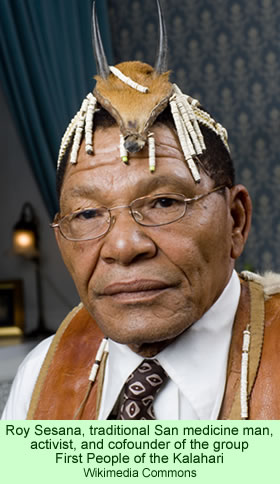President Ian Khama of Botswana announced last week that as of 2014 his government will no longer issue any hunting licenses. Some observers suspect that this is the latest government attack on the G/wi and the other minority San peoples of the Kalahari desert. The government responds that the measure is designed to protect the natural heritage of the country and to enhance the tourism industry.
 Roy Sesana, head of the advocacy group First People of the Kalahari, had a hard time believing that the government would go through with such a measure. His group suspects that the hunting ban must be aimed at city residents, the people of Gaborone, and others who are not dependent on game animals. “We will continue to hunt when we feel hungry. If there is a need to approach the courts, we will do just that,” he said.
Roy Sesana, head of the advocacy group First People of the Kalahari, had a hard time believing that the government would go through with such a measure. His group suspects that the hunting ban must be aimed at city residents, the people of Gaborone, and others who are not dependent on game animals. “We will continue to hunt when we feel hungry. If there is a need to approach the courts, we will do just that,” he said.
The San people, particularly the G/wi and the G//ana, have suffered repeatedly from harassment by the government of their country. They were forcefully expelled from their homes in the Central Kalahari Game Reserve in 1997, a government move which was overturned by the High Court of Botswana in December 2006. Despite repeated denials, it appears as if the major reason for the discrimination has been the government’s desire to control all of the revenues from diamond mining in the desert.
Then, the government resorted to depriving the people of water. After a protracted struggle, the rights of the San to have wells drilled for water in their communities was finally upheld in the Botswana Court of Appeals, the highest court in the nation, in January 2011.
During the last five years the government has also hassled the G/wi about hunting, as a news report in August 2009 indicated. And perhaps like the earlier cases, this hunting issue will have to be resolved by the nation’s courts. The San have secured the help of an NGO called the Botswana Khwedom Council to assist them in their latest fight. Keikabile Mogodu, the executive director of the council, confirmed the report that his group would assist by confronting the government about the matter.
President Khama said that the present practice of issuing hunting licenses was fostering poaching and hampering the growth of tourism. The news story from Botswana did not indicate if the government was aware of the extensive research by wildlife scientists on the efficacy of hunting. Such research typically shows that hunting that is carefully controlled through the issuance of licenses can boost the numbers of animals.
For instance, the annual autumn ritual of rifle buck season in many U.S. states at this time of year is a reminder of the importance of hunting for effective wildlife management. In Pennsylvania, white-tailed deer were virtually absent from the state by 1900. But the creation of the state Game Commission in 1895, the presence of game wardens who patrol and enforce the laws, and frequent empirical studies have allowed managers to build up the numbers of deer to the point where the state now has one of the densest herds of the animals in the U.S.
Mr. Mogodu clearly is on top of the issue. “We are deliberating,” he said, “on how we can engage [the] government on the issue as we feel the decision was taken swiftly without proper consultation and any empirical evidence to justify it.” He also said that the government’s decision contradicts its stated goal of eliminating rural poverty from the nation.
But his words were well reasoned. “I think it is important to identify areas that [are] affected most by over-hunting and perhaps introduce the [hunting ban] in phases rather than all at once, because some communities depend largely on some animal products.”
He said that the San people believe their hunting, which they have been doing for millennia, is sustainable. They feel that a ban would undermine their culture and traditions. He pointed out that community trusts have been established that depend on the revenues from trophy hunting. It is not clear how those activities will be affected.
A government spokesperson, Jeff Ramsay, made bland statements about the issue. “I am currently not aware of any special treatment in place but I can assure you that details of such and other cases will be communicated soon,” he said.
Minority group advocacy organizations in southern Africa are calling for their governments to stop ignoring the rights of the indigenous peoples. Mr. Mogodu urged governments to enact legislation and policies that would recognize the languages and cultures of the minority societies.
Reverend Mosweu Simane, general secretary of the Botswana Council of Churches, echoed this call. He emphasized the importance of governments addressing the many issues that concern the indigenous minority peoples.